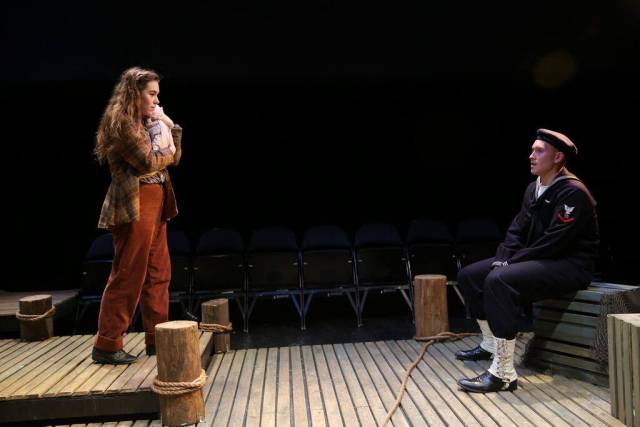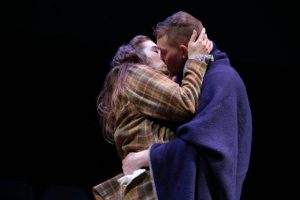

The Widow of Tom’s Hill, currently onstage at 59E59 Theaters, tells the story of an increasingly dangerous encounter between two people, a young widow and a sailor, set against the worst pandemic in recorded history. Winner of the 2015 Julie Harris Playwright Award Competition, the writer of this play, Aleks Merilo, sat down with StageBuddy to discuss this production and the ideas behind it.
When did you first become interested in this episode in history during the Spanish Flu outbreak and why did you decide to write a play about it?
Well, I’d been living in Oregon and Washington for the last six years and the coast area is kind of a haunting area. There are these kind of ghost towns, these towns that are kind of worn down or relics of towns. They’re eaten away by the water and the fog and everything and I just wondered what kind of people lived in them, because it is kind of a haunting sight. Separately I heard the story that the flu had hit this area harder than most places and the two of those stories just kind of combined. I’d also heard that in the state of Washington there were quarantines during the influenza and it could be as small as a few people being quarantined or it could be as large as a military base being quarantined. So, I really just combined those three elements and that’s sort of where it came from.
What was the process like of whittling down this worldwide pandemic to a story of two people, or three people, really, if you include the baby?
I wanted to see if I could tell a large story on a very small canvas. I like the idea of trying to create a world that exists offstage as well as onstage. Once you put an intimate face on an international crisis situation… that was one of the challenges that attracted me in the beginning of this, you know, how do I have the story of a world crisis told as intimately as possible?
And there are sort of two stories intersecting here; you have the story of the sailors on the ship and then the story of the town…
Absolutely, yeah.
 So you’re interested in these ghost towns on the land, but what about the seafaring aspect of it and seafaring stories in general?
So you’re interested in these ghost towns on the land, but what about the seafaring aspect of it and seafaring stories in general?
A lot of that came from being on the coast. I tell you, I can’t stress enough how haunting that is. I was also trying to think also of how to express the enormity of the situation. Like I said, for the last six years I’ve lived on the waterfront and there’s a lot of history in that. In the town I’m in right now, there’s a lot of people who go off to work in the morning and do the exact same work that would have been done a hundred years ago with slightly different technology and there’s a sort of living history in that. That’s something that I find really amazing.
Has history always been a draw for you?
Well, I mean, yes and no. Sometimes there’s an event that I’m drawn to or a certain situation. But I’m interested in a collection of stories and certainly a play can draw on that.
Now, while this huge virus was spreading across the world, there was also the greatest war that the world had known up to that point. Do you think that the two affected each other, especially with regards to the paranoia and that sort of thing?
Well, I remember thinking that if you’d been alive or I’d been alive at that time, it probably would have felt like the end of the world. I mean, there was just so little good happening at the time. I remember reading that more soldiers would die from the influenza than from bullets. In telling the story I wanted to underscore the violence of the time and I think it is a very violent play, even if most of it is offstage. I think the war in the background of this story is amplified or echoed by the personal interactions of the characters. I don’t know if they would have done the same thing if it had not been wartime.
Yeah, there’s a lot of paranoia and irrational behavior that is kind of carried to an extreme at the end. This might be a very broad question, but what do you think it is that drives people to be so irrational, to the point of endangering their children, their town, their fellows, etc.?
I think that, in the case of this play, I tried to put information on Aideen’s background and upbringing and what happened to her and who the father of her baby was and what happened to him that was stark enough that we belief she went through something that’s awful. I think her personal history is significant in that the sailor is the one who, oddly enough, comes off as less prone to violence in the beginning of the play, even though he’s the one carrying the rifle. But I think with him, and Aideen, too, it’s the idea of love and hate becoming the same emotion, the same action. What I was aiming for with the play, with the kiss between the two of them, was a gesture both of lust but also of absolute hatred. I think that was one of the big things that I wanted to stick with in this story, was the idea of love and hate crossing over to mean the same thing.
If you were just considering these two characters under normal circumstances, in some other narrative where they just met, do you think they would react in the same way? Do you think they would be attracted to one another?
Well, it’s tough to say. I certainly picked an environment that was a pressure-cooker, you know, the environment that would place them in the most stressful situation. But I haven’t really thought of them outside that situation, to be honest.
Yeah, I guess it’s hard to, huh? They’re pretty much defined by the situation.
Yeah, absolutely. You know, people are defined by whatever their situation is, especially in times of stress. They get to show their true selves in the end and sometimes that which is true to the self can be pretty ugly.
Yeah, sort of stripped down to primal instincts, I guess…
Yeah, you take away everything frivolous about a character and in the end you’re left with who they really are and who they are here are two incredibly violent people.
Did anything else besides the history influence the narrative arc or this idea of being sort of stripped down to the bare essentials?
Well, the director Rachel [Black Spaulding], she helped me a lot with it. We spent a lot of time on the phone just explaining each line one at a time, really, and one of her ideas was to tell a simple story about complex characters. So her advice was a huge, huge help in the direction of it.

I think there are a lot of parallels between this play and the modern age, but what do you think? What relevance does The Widow of Tom’s Hill, this play that takes place in 1918, hold for the world today?
Well, once the ebola outbreak was happening last year the play started getting a lot of attention, which I guess is one very literal connection. It was kind of surprising the way that lined up, and the play was selected right after that happened. You know, for me, it really comes back to the idea, like I said earlier, that when you strip a person down, you know, who are they really? I think in this modern world, modern America, we define ourselves in strange ways, by our jobs, our relationships, our circles, and I often wonder, how would we react in the most dire circumstances? How would we behave and what are we really capable of that might surprise us?
So, what drew you to that region of the country, the Pacific Northwest anyway? Was it circumstances, or were you just attracted to it or…?
I was offered a job as a teacher here and it couldn’t have worked out better actually. Now I live very close to the sea-setting of the play, where it should be taking place; you know, Tom’s Hill is not a real place, but I live in a town very much like it.
It occurs to me that maybe a lot of people aren’t really aware of this huge pandemic….
Yeah, it’s not something they really teach about in history class, you know?
Yeah, but if it affected that region of the country particularly, do you think this is something that your neighbors, in the broad sense of where you live, are aware of?
Actually, most of my students are not aware of this; they’re not even aware it happened, and they live particularly in that part of the world, and that’s kind of amazing to me.
Yeah, it seems to be a common thing where people aren’t aware of their local history even…
But, I mean, living out here, we pretty much live in the woods and you see all these relics, tools, equipment, automobiles from years and years and decades and decades ago and there’s these kinds of shadows of the past. Like I said, when I saw the houses rotting on the lakeshore and along the wharfs, that really helped shape the play.
And finally, are you working on anything new right now?
Yeah, I have a new play that’s coming out that I’m working on called The Snowmaker and it’s about a girl who hasn’t seen her father in about fourteen years and he shows up out of the blue and it turns out that he’s been a contractor for a mercenary group for the United States in Iraq and Afghanistan, like Blackwater. That’ll be coming out soon.
Performances of "The Widow of Tom's Hill" continue through November 15 at 59E59 Theaters.